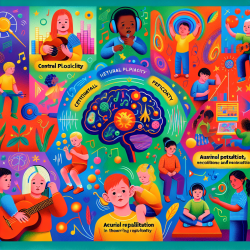Introduction
In the realm of speech-language pathology and child development, understanding cognitive abilities is crucial. A recent study titled "Pathfinder: a gamified measure to integrate general cognitive ability into the biological, medical, and behavioural sciences" offers innovative insights into cognitive assessment. This research highlights the potential of a gamified approach to measuring general cognitive ability (g) and its implications for enhancing educational and therapeutic outcomes.
The Pathfinder Study: A Game-Changer in Cognitive Assessment
The Pathfinder study introduces a 15-minute, 40-item online gamified measure of general cognitive ability, designed to be reliable, valid, and scalable. The measure, aptly named Pathfinder, was tested on 4,751 young adults from the Twins Early Development Study. The results showed strong correlations with standard cognitive measures collected at earlier ages, indicating its reliability and validity.
Key findings from the study include:
- High reliability with a Cronbach's alpha of 0.78 and a two-week test-retest reliability of 0.88.
- Substantial twin heritability (0.57) and SNP heritability (0.37).
- A polygenic score accounting for 12% of the variation in general cognitive ability, marking the strongest DNA-based prediction of g to date.
Implications for Practitioners
For practitioners in speech-language pathology and education, the Pathfinder study offers several practical applications:
- Enhanced Assessment Tools: Incorporating gamified cognitive assessments can provide a more engaging and accurate measure of a child's cognitive abilities, leading to better-informed intervention strategies.
- Data-Driven Interventions: The study's findings support the use of data-driven approaches in designing personalized educational and therapeutic interventions, maximizing the potential for positive outcomes.
- Research Opportunities: Practitioners are encouraged to explore further research opportunities using the Pathfinder measure to investigate the genetic and environmental factors influencing cognitive development.
Encouraging Further Research
The Pathfinder study opens the door to numerous research opportunities. By integrating this gamified measure into existing data collection platforms, researchers can further explore the genetic and environmental underpinnings of cognitive abilities. This could lead to breakthroughs in understanding the complex interplay between genetics, environment, and cognitive development.
Conclusion
The Pathfinder study represents a significant advancement in cognitive assessment, offering a reliable, engaging, and scalable tool for measuring general cognitive ability. For practitioners and researchers alike, this study provides a foundation for improving educational and therapeutic outcomes for children.
To read the original research paper, please follow this link: Pathfinder: a gamified measure to integrate general cognitive ability into the biological, medical, and behavioural sciences.










